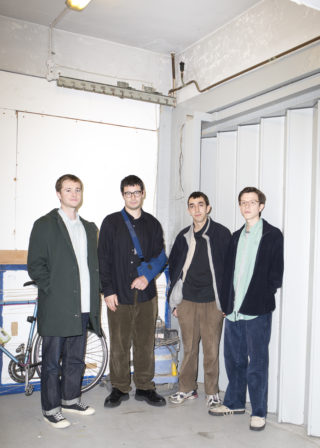Deathcrash
Return
9/10

9/10
The four members of London slowcore outfit Deathcrash are an unassuming bunch. Despite coming to prominence with other South London sensations such as Black Country, New Road, Jerskin Fendrix, and Black Midi, Deathcrash have always had a distinctly quaint energy about them, the shy kids in the corner quietly constructing something grand.
When I interviewed them this time last year, following the success of their beguiling and prescient EP People Thought My Windows Were Stars, they were quick to politely temper expectations. In truth, you could kind of see why.
The band’s music, which revels in repressively slow builds that climb to tortuously tense eruptions of cathartic release, was entirely in-sync with a world that was crumbling in 2020. The beautifully defined tensions nestled within Deathcrash’s sound resonated with the chaotic tensions that infiltrated our quarantined lives. The connection was further cemented by vocalist and guitarist Tiernan Banks’ open lyricism that implored you to listen to a story that might well be about you.
The fact that veteran Scottish post-rock band Mogwai, a pivotal influence on Deathcrash, picked up their first ever UK number one album after 25 years shortly after we spoke, gave credence to the feeling that the tangled genres of slowcore, post-rock, and shoegaze were having a bit of a moment.
We left our conversation last year with a quasi-serious concern about their potential longevity and relevance. “Maybe when the debut album comes out, no one will care anymore,” said Banks, “It would be great to have some kind of apocalypse next year too,” added guitarist Matthew Weinberger.
There wasn’t to be another apocalypse, just the same old one simmering along. However, what has become clear in the interim is that the world’s pervasive chaos has little to do with Deathcrash’s appeal. The band’s irresistible blend of slowcore’s honest focus on minimalist instrumentation and stripped-back production, propped up by the narrative structure of post-rock, allows the band to alchemise the personal and the universal. It’s a formula that’s frequently capable of transcendence, and its magic is beginning to spread.
In an interview with Loud and Quiet, Speedy Wunderground producer extraordinaire Dan Carey noted the unique space Deathcrash inhabit: “They’re different from those bands [Squid, Black Country, New Road and Black Midi], much less aggressive but still very weird and dark.” In another interview (with The Quietus), Black Country, New Road discussed re-evaluating their sound’s balance after touring with Deathcrash in early 2020, ultimately paying greater attention to how they could use dynamics to create more “impactful” music.
As such, Deathcrash’s trajectory mirrors one of their own songs, starting quiet and gently growing louder. Therefore, likely much to the quartet’s bewilderment, their 12-track, hour-long debut album Return arrives full of hype. It also comes with sizable questions: how does a band who have already penned a 3-track, 45-minute EP transition to a full album? How does a post-rock flavoured slowcore band regulate the album’s momentum to avoid becoming a platitude of louds and quiets? How do they evolve the traditionally ’90s American sound to feel authentic from a British outfit made up of twenty-somethings? In essence, how do they prevent themselves becoming “The world’s second best Slint tribute act”?
Well, a lot of questions are answered with the eight-minute opener ‘Sundown’. Built from the ground-up, the track begins with a sober introduction of each instrument: Noah Bennett’s fragile but dictating hi-hat taps, the band’s ever-present blend of folkish nostalgic guitar and dominating power chords that’s impossible to ascribe to either Weinberger or Banks, and Patrick Fitzgerald’s chunky bass that, when reverbed enough, acts as a third guitar.
‘Sundown’ steadily builds itself to a tense stasis, the music locked in a delicate battle between voice and fuzzy fed-back guitar, until about two-thirds of the way through the song, when there is a drastic melodic shift, followed by another, and then another. It’s an abrupt and exhilarating fast fracture that unglues the entire track; with decibels, instrumental density, and tempo ratcheting up at an unsustainable velocity, culminating in a monumental krautrock-tinged freak-out.
This is Deathcrash unleashed like never before, shattering the eardrums while still soothing the soul, expertly mixing the musical merits of Explosions in The Sky, Codeine, and NEU! like it’s the most obvious thing in the world. In one song, Deathcrash show that they haven’t stood still.

Having had so many questions prior to listening to the album, only one remains after listening through ‘Sundown’ – how can they top this? Well, the answer is that they don’t – nor do they try to. Deathcrash instead use the remaining 56 minutes of Return to make 11 other statements, 11 other untoppable tracks that operate by their own rules and draw on their own inspirations. Songs that stand alone, but when put together create a tapestry to moody, oneiric music – incorporating elements of singer-songwriter, doom metal, stoner metal, sludge metal, drone metal, folk, emo, screamo, and more, to build a colossal testament to the loosely defined genre of slowcore.
‘Unwind’ nestles in the familiar world of ‘sadcore’. Ridden by a melancholic tempo, the scratchy but sonorous melody brings out Banks’ choppy vocals that sound smeared in tears as he tells his lover ‘I wasn’t resting / I wasn’t living’. It’s the embodiment of an honest reflection found from looking in an opaque pool.
‘American Metal’ is seasoned with a tender third-wave American emo, even slyly referencing Taking Back Sunday’s ‘My Blue Heaven’ in the lyrics. Its pastoral pace and floral floating chords mean that the music roams rather than ascends, tilling the sound for every crevice of sentiment. But even in its pedestrian tempo, the song travels miles.
The band’s post-rock penchant for embedding recondite samples to drive narrative is also used to expert effect on Return. In particular, ‘Matt’s Song’ is a tender departure from the lyrically-narrated tracks, instead splicing in samples from what sounds like home movies. It washes the track with a halcyon hue, as the solitary plucking of acoustic strings steers the song through a patchwork of suppressed, but recorded memory.
Mid-track ‘Wrestling With Jimmy’ is the inverse: a hellacious, anxious ride, and the album’s flash point. The snake-like chords, imbrued with sinister lyrics that announce “I have dreams / that they visit”, gives way to a catastrophic Steve Albini wall of sound, where the guttural screams of Banks are drowned in the background, bursting to be let out, but instead lost in the galloping drums. It could well be the absolute standout on Return, a track that condenses the dynamics that would usually require 15 minutes, instead being achieved in a 2-minute behemoth. It’s a cheat-code of a song.
‘Metro 1’ is the album’s cool-down. Decked in resplendent strings and with gorgeous arrangements. It is the most textured of the songs on Return. The exploration of Bennett’s drum kit, that is regularly the unsung hero of the record, and the creeping paranoia of the guitars leads not to a colossal breakdown, but a stark recognition, finishing with a dream-rock daze reminiscent of Mogwai’s former Chemikal Underground labelmates Aerogramme.
Penultimate track ‘Doomcrash’ is the album’s longest at just under nine minutes. Its build is the most mystic and folky on Return, honed-in on Banks’ suggestive lyrics, with only faint instrumentation heard. But it all leads to the album at its absolute heaviest. The roaring riff summoned here that upends the track is transfused directly from the most cavernous doom metal. ‘Doomcrash’ is also the album at its most emotionally heavy. The story told throughout Return of two slowly separating lovers comes to a head here with Banks singing “All in life that I love / Runs away again / To know the thought in your head / Goes away again”. For all the instrumental mastery at work during this album, it’s the misty memories that inform the lyrics that truly make the spirits stalking this record feel alive.
Return ends arguably where it all began. ‘The Low Anthem’ pays tribute to the amorphic Minnesotan duo Low, who are frequently labelled as slowcore’s progenitors, with the narrative reaching its apotheosis as Banks sings “God bless the reason we die”. It’s a fitting finale for a richly varied album which consigns itself to a fixed palette, but uses it to paint the most wondrous and far-reaching landscapes imaginable.
Deathcrash’s Return is an embarrassment of musical riches that is only matched by the depth of evocations that haunt the record, its power both life-affirming and oddly absent, like a photo of a happier time that’s starting to fade. In its totality, Return feels like a keepsake for when the world truly ends, to be played back like the home videos in ‘Matt’s Song’, to remind us what was lost.